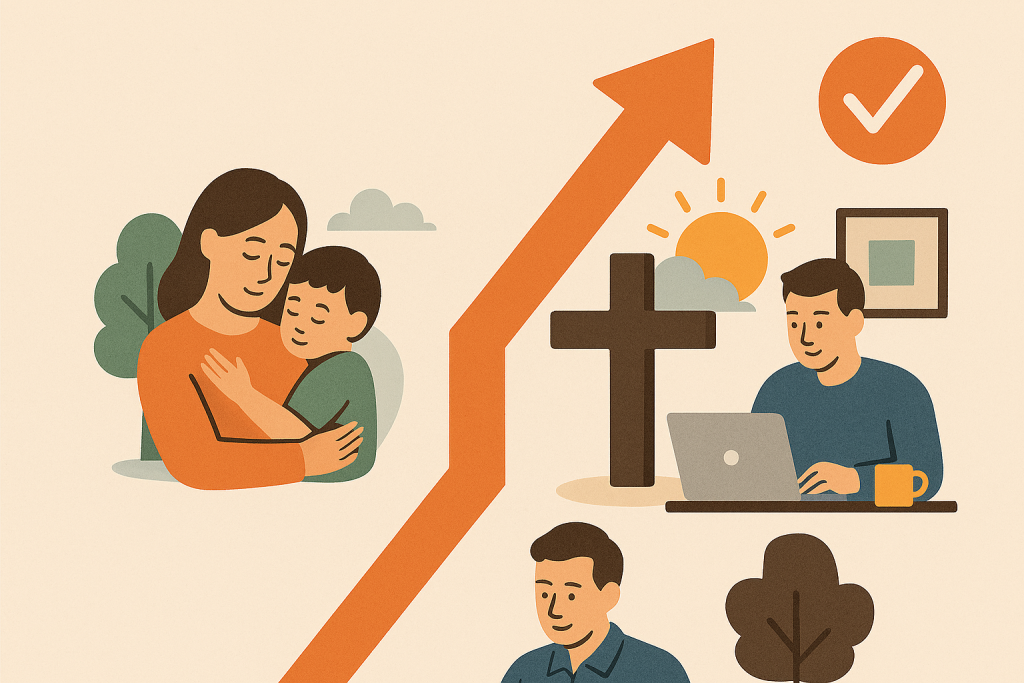First Things First — Why Priorities Matter in Life, Faith, and Work
One of the clearest lessons I’ve learned in life — through my faith, my work, and my own mistakes — is that getting your priorities right is the key to a successful life.
I am a Christian, so in terms of priorities of course I believe God comes first. “But seek first the kingdom of God and His righteousness, and all these things will be added to you” (Matthew 6:33). I certainly don’t always manage it, but when my priorities are ordered correctly — God first, then my wife and family, then my community and country, and then my work and earning money — the rest of life falls into place more naturally.
When those priorities are reversed or scrambled, the consequences can be disastrous. If I put work above God, or entertainment above family, I start to feel the effects — restlessness, dissatisfaction, or an underlying unease. To refer to the Bible again, scripture is full of examples of people who chose the immediate over the eternal — Esau selling his birthright for a bowl of stew (Genesis 25:29–34) comes to mind — and the results were not pretty.
Short-Term vs Long-Term Entertainment
Misplaced priorities often start with a subtle temptation: choosing what feels good now over what is truly satisfying later.
For some, that might mean alcohol or drug abuse; for others, it’s endless scrolling or binge-watching. These things offer temporary relief but leave nothing lasting. By contrast, prioritising things like a job well done, a workout completed, or a meaningful conversation with a loved one provides joy and builds a foundation for future growth. Proverbs 21:5 reminds us, “The plans of the diligent lead surely to abundance, but everyone who is hasty comes only to poverty.”
Prioritisation at Work — Especially When You’re Your Own Boss
One of the trickiest places to live out right priorities is in self-employment, especially when working from home. When you are both the CEO and the cleaner, everything is “your job.”
It’s easy to over-focus on one type of task. Spend all day cleaning the office, and you might miss closing the next big deal. Ignore the cleaning entirely, and before long you can’t think straight in your workspace. Ecclesiastes 3:1 says, “For everything there is a season, and a time for every matter under heaven.” This includes both mission-critical work and the “mundane” upkeep tasks.
Why I’m Building an AI-Powered Prioritisation System
Out of decades of self-employment — and more than a few mistakes — I’ve been developing an AI-powered prioritisation system in Ruby on Rails, with applications in education and beyond.
The goal: to help people (including me) focus on the right thing at the right time. Here’s the logic:
-
Importance — Is it mission-critical, or “nice to have”?
-
Deadline — How strict is it? How far away is it?
-
Duration — Will it take minutes or days?
-
Impact of Delay — What happens if it’s postponed?
A long, important task may get a higher priority than a short one, but a tiny, low-importance task might still jump the queue if it’s easy to clear off the list. This prevents those “two-minute tasks” from hanging around for months.
And because life changes — deadlines move, priorities shift, importance grows — the system regularly re-evaluates your list. That way, I avoid those haunting, never-finished tasks that seem to follow me for years, and I can answer confidently, “Yes — this is the best use of my time right now.”
Beyond Work — Remembering the Bigger Picture
Even the best prioritisation system for work means nothing if your life priorities are upside-down. I want my AI to help people at work — but I also want to remind them that work itself isn’t ultimate.
In the Gospels, Jesus tells the parable of the rich fool (Luke 12:16–21), who spent his life building bigger barns to store his wealth, only to die that very night. His problem wasn’t poor planning — it was misplaced priorities.
If my system helps someone clear their inbox but neglects their soul, it will have failed in the most important way.
Prioritisation is more than a productivity trick. It’s a life principle — one that Scripture has taught for thousands of years and one that modern tools (even AI) can help us apply day by day.
As I continue building my Ruby on Rails prioritisation system, my hope is that it won’t just make people more productive — it will free them to put first things first in every area of their lives.


